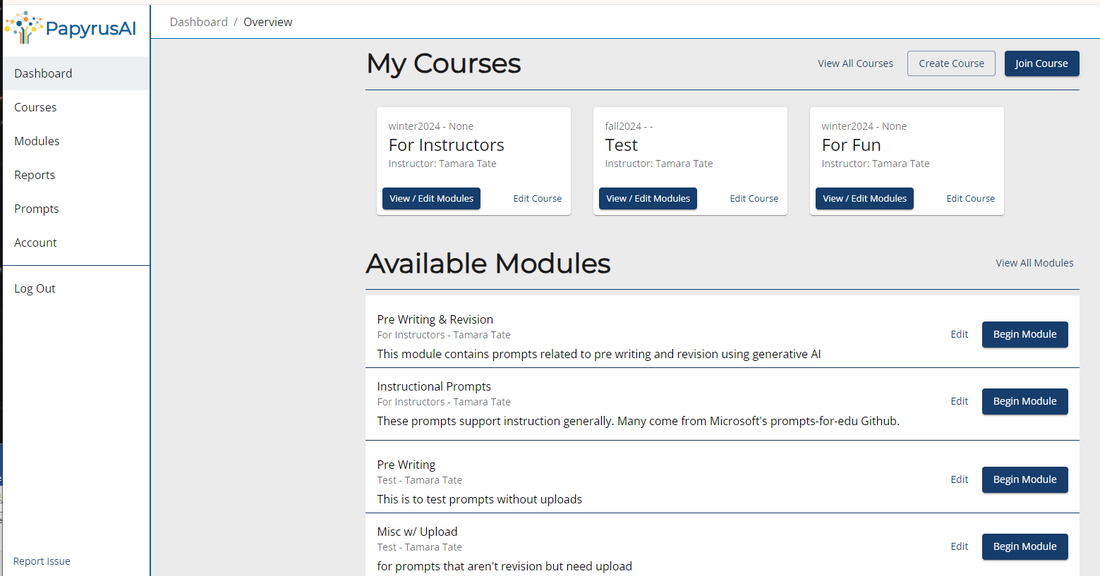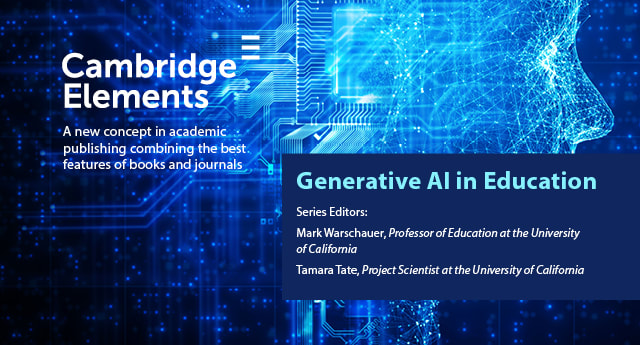PapyrusAIGenerative AI has the potential to dramatically effect education. We are working on a number of initiatives to design, implement, and evaluate approaches for improving education with generative AI.
These largely fall into two main buckets: promoting digital literacy and writing with AI, and promoting computational literacy with AI. (In addition to that, we also have ongoing work creating interactive children's media with AI in our Converse to Learn project.)
Digital Literacy and Writing
We view AI literacy as an important component of digital literacy, encompassing understanding, accessing, prompting, corroborating, and incorporating AI-generated texts--and we view these new forms of AI literacy as a key element of writing instruction. Through our NSF funded project, Incorporating Generative Artificial Intelligence in Engineering Writing Courses, we are iteratively developing an AI platform and curriculum, PapyrusAI, for integration into undergraduate engineering writing courses at the University of California, Irvine, and eventually into other universities and into k-12 classrooms.
Publications:
Computational Literacy
AI literacy is not only a digital literacy, it is also a form of computational literacy, involving using, modifying, and creating artificial intelligence tool. Through CodeAI, we are designing a 6-week, project-based AI literacy curriculum and platform to be integrated into middle school STEM classes.
Dissemination
We are strongly committed to promoting understanding of generative AI among educators and researchers. In July 2023, we organized Pens & Pixels, a national online conference on generative AI in education. The website remains available both for access to the video recordings and slides of the presenters, as well as a repository of resources on generative AI in education. More recently, we have spoken to community colleges (Reedley [SLIDES]), conferences (Literary Research Association [SLIDES]), and Board of Education (Santa Clara [SLIDES]), among others, to help educators navigate the rapidly evolving state of generative AI in education.
In addition, we are serving as editors of a Cambridge Elements series on Generative AI in Education. Please contact us at [email protected] if you are interested in proposing a 20,000-30,000 word monograph for the series.
These largely fall into two main buckets: promoting digital literacy and writing with AI, and promoting computational literacy with AI. (In addition to that, we also have ongoing work creating interactive children's media with AI in our Converse to Learn project.)
Digital Literacy and Writing
We view AI literacy as an important component of digital literacy, encompassing understanding, accessing, prompting, corroborating, and incorporating AI-generated texts--and we view these new forms of AI literacy as a key element of writing instruction. Through our NSF funded project, Incorporating Generative Artificial Intelligence in Engineering Writing Courses, we are iteratively developing an AI platform and curriculum, PapyrusAI, for integration into undergraduate engineering writing courses at the University of California, Irvine, and eventually into other universities and into k-12 classrooms.
Publications:
- The affordances and contradictions of AI-generated text for writers of English as a second or foreign language (published paper)
- ChatGPT in education: Global reactions to AI innovations (published paper)
- Comparing the quality of human and ChatGPT feedback of students’ writing (published paper)
- Educational research and AI-generated writing: Confronting the coming tsunami (preprint)
- Emergent AI-assisted discourse: Case study of a second language writer authoring with ChatGPT (preprint)
- AI-writing tools in education: If you can’t beat them, join them (published paper)
- Can AI provide useful holistic essay scoring? (preprint)
- “ChatGPT seems too good to be true”: College students’ use and perceptions of generative AI (preprint)
Computational Literacy
AI literacy is not only a digital literacy, it is also a form of computational literacy, involving using, modifying, and creating artificial intelligence tool. Through CodeAI, we are designing a 6-week, project-based AI literacy curriculum and platform to be integrated into middle school STEM classes.
Dissemination
We are strongly committed to promoting understanding of generative AI among educators and researchers. In July 2023, we organized Pens & Pixels, a national online conference on generative AI in education. The website remains available both for access to the video recordings and slides of the presenters, as well as a repository of resources on generative AI in education. More recently, we have spoken to community colleges (Reedley [SLIDES]), conferences (Literary Research Association [SLIDES]), and Board of Education (Santa Clara [SLIDES]), among others, to help educators navigate the rapidly evolving state of generative AI in education.
In addition, we are serving as editors of a Cambridge Elements series on Generative AI in Education. Please contact us at [email protected] if you are interested in proposing a 20,000-30,000 word monograph for the series.





